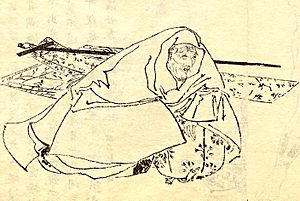Fujiwara no Shunzei facts for kids
Fujiwara no Shunzei (藤原 俊成), born in 1114 and passing away on December 22, 1204, was a famous Japanese poet and a person from a noble family. His father was Fujiwara no Toshitada. He was also known as Fujiwara no Toshinari or Shakua. When he was younger (from 1123 to 1167), his name was Akihiro. But in 1167, he changed it to Shunzei.
Shunzei was known for his new ideas in the waka style of poetry. He also achieved something very important: he put together the Senzai Wakashū ("Collection of a Thousand Years"). This was the seventh Imperial anthology of waka poetry. He was asked to do this in 1183 by the Retired Emperor Go-Shirakawa. Even though Shunzei didn't have a very high rank at court, the Emperor admired him.
The Emperor's trust in Shunzei was a big deal. Imperial poem collections were super important events in the court's poetry world. Poets even risked their lives just to have one of their poems included! The famous story The Tale of the Heike tells us that Shunzei was working on the Senzai Wakashū during the Genpei War. During this war, Taira no Tadanori, who was on the opposing side, bravely went into enemy land to Shunzei's house. He asked Shunzei to include one of his poems. Tadanori then managed to escape back to his own forces without being caught. Shunzei did decide to include Tadanori's poem, but he wisely listed it as by "Anonymous." Shunzei's son, Fujiwara no Teika, is thought to be one of the four best poets in Japanese history.
Shunzei belonged to the famous Fujiwara clan, which was known for its poets and noble families. Since his father, grandfather, and many other relatives were all interested in literature and poetry, Shunzei started writing poems when he was young. He often liked an older style of poetry, like what you see in the Man'yōshū. But he also used ideas from Chinese poems that were new to Japan.
From a literary criticism point of view, Shunzei was one of the first people to really like The Tale of Genji. After he turned 30 and 40, he became especially known for his opinions and decisions at poetry gatherings and contests. He liked poems that showed a style called yugen. This was one of the ten main styles of poetry. It focused on showing romantic feelings, often with a hint of sadness or longing for the past. His style was sometimes described as "old words, new treatment." He wrote that poems "should somehow... produce an effect of both charm and of mystery and depth. If it is a good poem, it will possess a kind of atmosphere distinct from its words and their configuration and yet accompanying them." Here is an example of his poetry:
|
Yū sareba |
As evening falls, |
His style was very careful, sensitive, and full of emotion. The poet Shinkei (140-1475) described how Shunzei wrote poetry:
- "Very late at night he would sit by his bed in front of an oil lamp so dim it was difficult to tell whether it was burning or not, and with a tattered court robe thrown over his shoulders and an old court cap pulled down to his ears, he would lean on an armrest, hugging a wooden brazier for warmth, while he recited verse to himself in an undertone. Deep into the night, when everyone else was asleep, he would sit there bent over, weeping softly."
When he was 63, in 1177, Shunzei decided to leave the everyday world and became a Buddhist monk. He took the religious name "Shakua." Most of his ideas about poetry come from his main work of criticism, Fūteishō ("Notes on Poetic Style Through the Ages"). He wrote this book in 1197, a decade after the Emperor asked him to create the poetry collection. He revised it in 1201.
His son, Fujiwara no Teika, became an even more famous poet than his father. Teika was also more successful in court politics. Shunzei only reached the rank of "Chamberlain to the Empress Dowager." Shunzei's granddaughter, Fujiwara Toshinari no Musume (born around 1200), was also a successful poet. She is often called "Shunzei's Daughter" because not much else is known about her. Shunzei raised and taught her, and Teika even asked for her advice after Shunzei passed away.
About Shunzei's Life
Fujiwara no Shunzei was born in 1114. He was a descendant of the important statesman Fujiwara no Michinaga. His father was Fujiwara no Toshitada from the Mikohidari branch of the Fujiwara clan.
When Shunzei was ten years old, his father died. He was then adopted by Hamuro Akiyori. As Akiyori's adopted son, he used the name Akihiro. But in 1167, when he was 53, he went back to his birth family's house and took the name Toshinari. (The name Shunzei is just the Chinese-Japanese way of reading the same characters used for Toshinari.)
At the court, he reached the position of Kōtai Gōgū-daibu. He also held the Senior Third Rank, which was a good but not top-level position.
In 1176, at age 62, he became a Buddhist monk. He took the religious name Shakuagaku or Shakua.
Shunzei died on December 22, 1204, when he was 90 years old.
See also
 In Spanish: Fujiwara no Toshinari para niños
In Spanish: Fujiwara no Toshinari para niños
 | Jessica Watkins |
 | Robert Henry Lawrence Jr. |
 | Mae Jemison |
 | Sian Proctor |
 | Guion Bluford |


